

Ok, Everybody, Let's Do This! - project management tools - employee collaboration. Conflicting personalities, control freaks, and co-workers who don't pull their share of the load are just a few of the potential problems you can encounter when working as a team, but at least sharing files and keeping track of the workload have gotten easier.
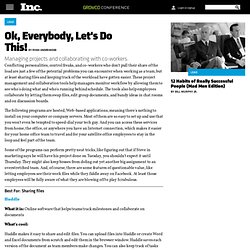
These project management and collaboration tools help managers monitor workflow by allowing them to see who's doing what and who's running behind schedule. The tools also help employees collaborate by letting them swap files, edit group documents, and bandy ideas in chat rooms and on discussion boards. The following programs are hosted, Web-based applications, meaning there's nothing to install on your computer or company servers. Most of them are so easy to set up and use that you won't even be tempted to speed-dial your tech guy. Some of the programs can perform pretty neat tricks, like figuring out that if Steve in marketing says he will have his project done on Tuesday, you shouldn't expect it until Thursday. Huddle. Which Employees Are Your Company’s Best Brand Ambassadors? It's a speech we've heard time and time again: A corporate CEO or entrepreneur will take the stage and proclaim "Our greatest asset is not in our inventory or our sales or our products—but in our people.
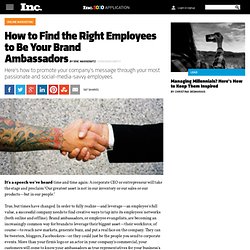
" True, but times have changed. In order to fully realize—and leverage—an employee's full value, a successful company needs to find creative ways to tap into its employees' networks (both online and offline). Everything to Teach Your Employees About Social Media. Who needs an expensive social media consultant when you can train your employees in Twitter, Facebook and LinkedIn best practices yourself?
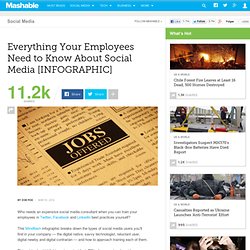
This Mindflash infographic breaks down the types of social media users you'll find in your company — the digital native, savvy technologist, reluctant user, digital newby and digital contrarian — and how to approach training each of them. This guide also highlights an important fact: 76% of companies do not have a clearly defined social media policy. Whether or not you have an explicit policy, make sure you're aware of the way everyone in your company represents your brand. What do you think its most important for companies to teach their employees about social media? Share your best practices in the comments. Ok, Everybody, Let's Do This! - project management tools - employee collaboration.
Why We Use Social Media in Our Personal Lives — But Not for Work - Tammy Erickson. By Tammy Erickson | 12:05 PM February 16, 2012 “We’ve spent a fortune on collaborative technology, but no one is using it … or if they are, it’s for purely social, non-productive activities.”
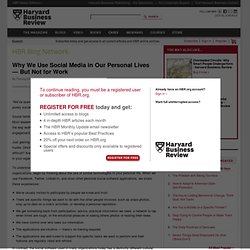
Sound familiar? It’s a lament I’ve heard many times from organizations over the past several years. Most leaders are sold on the tremendous potential new collaborative technologies present to change the way work gets done: increasing productivity, stimulating innovation, and enhancing employee engagement. But realizing the benefits is proving to be a frustrating challenge for many. Just gaining widespread adoption — getting people to use the technology — can present a major hurdle.
To understand the challenges of using collaborative or social software inside business organizations, begin by thinking about the use of similar technologies in your personal life. We’re usually invited to participate by people we know and trust. These differences are at the heart of the adoption dilemma. Do Your Employees Follow You on Social Media? I treat Facebook and Twitter pretty differently – I use Twitter (@janinepopick) for business and Facebook for both.
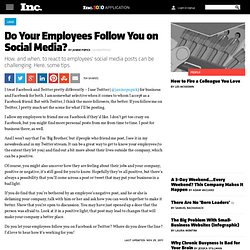
I am somewhat selective when it comes to whom I accept as a Facebook friend. But with Twitter, I think the more followers, the better. If you follow me on Twitter, I pretty much set the scene for what I’ll be posting. I allow my employees to friend me on Facebook if they’d like. I don’t get too crazy on Facebook, but you might find more personal posts from me from time to time. 10 Golden Rules To get Employees on Board With Social Media. Which Employees Are Your Company’s Best Brand Ambassadors? S Must Embrace Social Networks to Drive Social Business. Maybe it's because their jobs are too demanding to make the time or maybe they're just not interested, but one thing is clear: According to a new study, CIOs just aren't into social media.
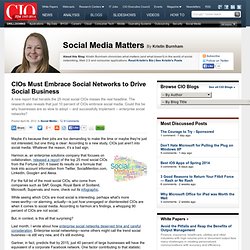
Whatever the reason, it’s a bad sign. Harmon.ie, an enterprise solutions company that focuses on collaboration, released a report of the top 25 most social CIOs from the Fortune 250. It based its results on a formula that took into account information from Twitter, SocialMention.com, LinkedIn, Google+ and Alexa. Social Business Design. Study: Enterprise social networks failing to meet expectations. News By Juan Carlos Perez February 27, 2012 01:08 PM ET IDG News Service - Enterprise social networking (ESN) software can improve communication and collaboration among employees, but most companies aren't implementing and using these products properly, leading to unmet goals, according to a new study.
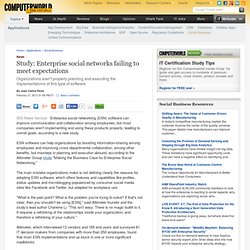
ESN software can help organizations by boosting information-sharing among employees and improving cross-departmental collaboration, among other benefits, but missteps in planning and execution abound, according to the Altimeter Group study "Making the Business Case for Enterprise Social Networking. " The main mistake organizations make is not defining clearly the reasons for adopting ESN software, which offers features and capabilities like profiles, status updates and microblogging popularized by consumer social media sites like Facebook and Twitter, but adapted for workplace use.
"What is the pain point? Related Blog Reprinted with permission from IDG.net. 6 Reasons Savvy Businesses Use Email, Not Social Media. PLUS: 2 Email Tools You Should Know About. We all know that social media and blogs are important – content (rather content in context) is the new digital currency of our professional and personal lives.
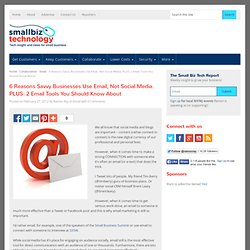
However, when it comes time to make a strong CONNECTION with someone else it’s often an email (or a text) that does the trick. I Tweet lots of people. My friend Tim Berry (@timberry) guru of business plans. Or mister social CRM himself Brent Leary (@brentleary). However, when it comes time to get serious work done, an email to someone is much more effective than a Tweet or Facebook post and this is why email marketing is still so important. I’d rather email, for example, one of the speakers of the Small Business Summit or use email to connect with someone to interview at SXSW.